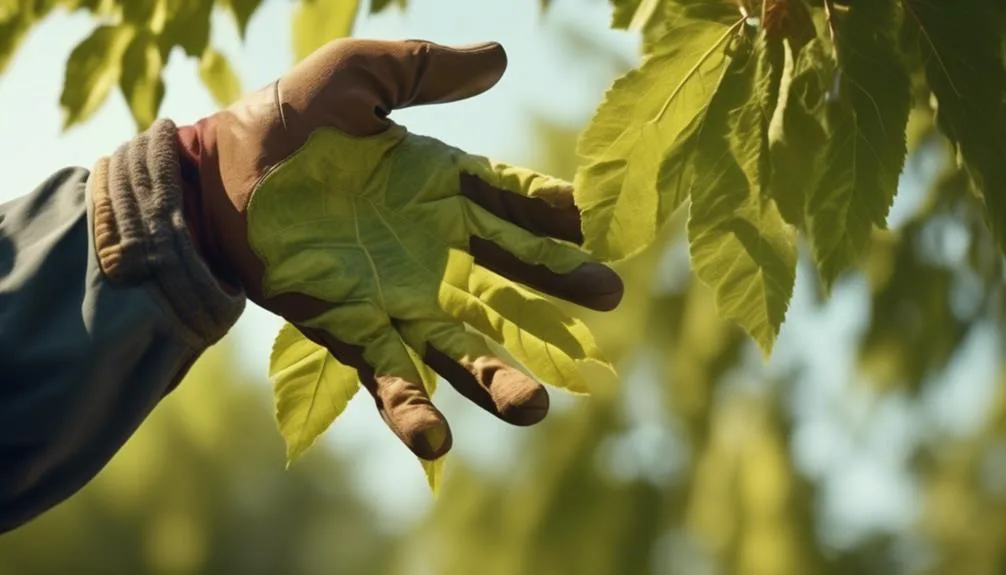If your hickory tree is struggling with diseases, there are natural ways to help it recover. Using organic methods can effectively fight off diseases and improve the overall health of your hickory tree.
Let's look at some practical and eco-friendly ways to keep your hickory tree strong and disease-free.
Identifying Hickory Tree Diseases
To identify hickory tree diseases, observe the leaves and nuts for any unusual discoloration, spots, or lesions, and inspect the bark and branches for signs of damage or decay.
Common symptoms of hickory tree diseases include wilting, yellowing, or browning of leaves, as well as the presence of powdery mildew or leaf spots.
Proper diagnosis is crucial for effective treatment, so it's important to consult with a professional arborist or horticulturist if you suspect your hickory tree may be diseased.
Pest identification is also essential, as certain insects can cause damage to hickory trees.
Implementing prevention tips such as proper pruning, maintaining good soil health, and ensuring adequate air circulation around the tree can help reduce the risk of diseases and pests affecting your hickory tree.
Organic Disease Prevention Measures
Consider implementing organic disease prevention measures to maintain the health and vitality of your hickory tree. By incorporating holistic care and sustainable practices, you can effectively prevent diseases while promoting the overall well-being of your tree. Here are four organic disease prevention measures to consider:
- Proper Pruning: Regularly prune your hickory tree to remove dead or diseased branches, allowing for better air circulation and reducing the risk of fungal infections.
- Healthy Soil Management: Maintain nutrient-rich soil by using organic mulch, compost, and natural fertilizers to support the tree's immune system and resilience to diseases.
- Adequate Watering: Water your hickory tree deeply but infrequently to encourage deep root growth and reduce the likelihood of water-related diseases.
- Natural Predators: Encourage the presence of beneficial insects and birds that help control pest populations, contributing to a balanced ecosystem and reducing the risk of infestations.
Natural Treatment Options for Hickory Tree Diseases
Maintaining the health and vitality of your hickory tree through organic disease prevention measures sets the foundation for addressing any potential diseases.
Now we'll explore natural treatment options to combat specific hickory tree diseases.
When it comes to addressing hickory tree diseases, herbal remedies and homeopathic solutions offer a holistic approach to healing.
For example, using herbal remedies like neem oil or garlic spray can help combat common fungal infections.
Additionally, a holistic approach involves promoting overall tree health through proper watering, mulching, and regular pruning.
Homeopathic solutions, such as biodynamic tree preparations, can also support the tree's natural defenses.
Embracing a holistic healing approach not only treats the symptoms but also strengthens the tree's resilience against diseases, promoting long-term vitality.
Soil and Nutrient Management for Disease Resistance
Improving the soil quality and optimizing nutrient levels can significantly enhance your hickory tree's resistance to diseases. Here are four essential strategies for soil and nutrient management to promote your hickory tree's health and disease resistance:
- Soil Testing: Conduct regular soil tests to assess the pH levels and nutrient content, ensuring that the soil provides an optimal environment for hickory tree growth.
- Organic Matter Addition: Incorporate organic matter such as compost or well-rotted manure into the soil to improve its structure, water retention, and nutrient availability, promoting overall soil health.
- Mulching: Apply a layer of mulch around the base of the tree to conserve moisture, prevent soil compaction, and enhance nutrient absorption.
- Balanced Fertilization: Use organic fertilizers to provide a balanced mix of essential nutrients, supporting the hickory tree's growth and disease resistance.
Integrated Pest Management for Hickory Trees
To further enhance the health and disease resistance of your hickory tree, it's important to implement an integrated pest management strategy that effectively addresses potential threats to its well-being. Pest control and tree pruning are crucial components of this strategy. Regularly inspect your hickory tree for signs of pests such as aphids, caterpillars, or borers, and take appropriate measures to control their population. Additionally, proper tree pruning can promote good air circulation and sunlight exposure, reducing the risk of pest infestations. Below is a table outlining some common pests and recommended pest control methods for hickory trees:
| Pest | Control Methods |
|---|---|
| Aphids | Insecticidal soap, ladybugs |
| Caterpillars | Bt (Bacillus thuringiensis) |
| Borers | Trunk injections, nematodes |
Integrating these pest management practices into your hickory tree care routine will help ensure its long-term health and vitality.
Conclusion
To sustain the health of hickory trees organically, early disease identification, natural prevention methods, and soil maintenance are essential.
Embracing integrated pest management eliminates the need for harmful chemicals, ensuring the longevity of these majestic trees.
With dedicated care, the beauty of hickory trees can thrive for years to come, harmonizing with nature's balance.

My interest in trees started when I first saw the giant sequoias in Yosemite.
I was a teenager then, and I remember thinking, “I need to learn more about this.”
That moment stuck with me.
A few years later, I went on to study forestry at Michigan Tech.
Since graduating, I’ve worked in a mix of hands-on tree care and community education.
I’ve spent over ten years helping people understand how to plant, maintain, and protect the trees in their neighborhoods.
I don’t see trees as just part of the landscape.
They are living things that make a real difference in our daily lives.
